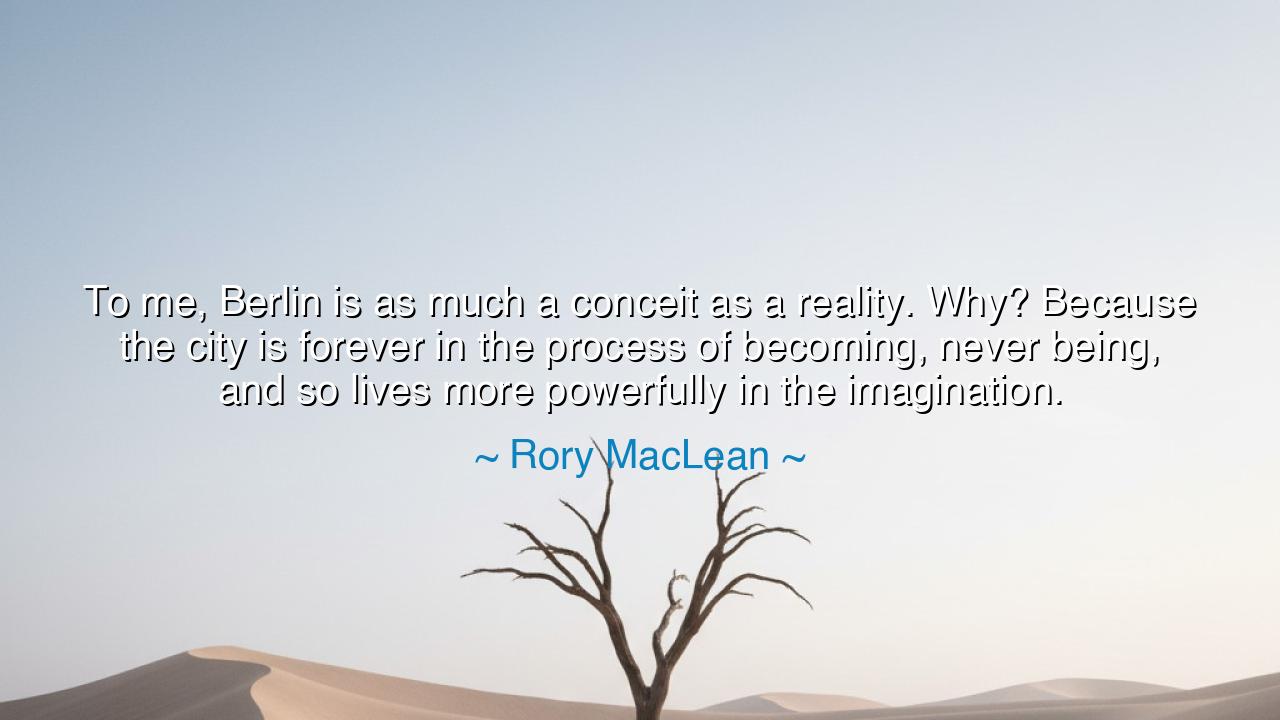
To me, Berlin is as much a conceit as a reality. Why? Because the
To me, Berlin is as much a conceit as a reality. Why? Because the city is forever in the process of becoming, never being, and so lives more powerfully in the imagination.






“To me, Berlin is as much a conceit as a reality. Why? Because the city is forever in the process of becoming, never being, and so lives more powerfully in the imagination.” — these words of Rory MacLean breathe with the spirit of transformation, a truth as ancient as time itself. His vision of Berlin transcends the mere stones and streets of the city; he speaks of it as a living soul, restless and unfinished, reborn with every age. It is both real and imagined, a place that stands in the world yet also in the mind — a mirror of humanity itself. For all of us, like Berlin, are forever in the process of becoming, never fixed, always transforming under the fire of experience and the wind of time.
In the ancient way, this quote would have been spoken as a parable — for it teaches that identity, whether of city or soul, is not a fixed monument but a flowing river. Berlin, scarred by history and redeemed by resilience, stands as a symbol of impermanence and rebirth. From the ashes of war, from the shadow of walls that once divided its heart, it rose again — not as it was, but as it might be. And so it remains, not settled, but searching. The city’s power lies not in its stability, but in its capacity to imagine itself anew.
History bears witness to this truth. After the Second World War, Berlin was a city torn in two — East and West, split by ideology, walled by fear. Yet within that fracture, the imagination of freedom burned bright. Artists, thinkers, rebels, and dreamers flocked there, drawn not by comfort but by possibility. When the Berlin Wall finally fell in 1989, it was not just concrete that crumbled, but the illusion that human division could endure forever. The city became a vast canvas for creation — graffiti on broken walls, music in old factories, hope in the ruins. Thus, Berlin’s strength was not in what it was, but in what it could become.
This is the essence of MacLean’s wisdom: that becoming is the soul’s highest calling. To “be” is to stagnate; to “become” is to live. Just as Berlin forever reshapes itself from memory and imagination, so too must each human spirit rise from its past into the art of becoming. The sages of old would have called this the dance of creation — that the universe itself is not a finished work but an eternal act of imagining. To live, then, is to participate in that divine act, to let imagination sculpt the soul’s form again and again.
The imagination, in this sense, is the architect of destiny. Without it, ruins remain ruins; with it, ruins become temples. Berlin, in MacLean’s words, lives more powerfully in the imagination than in brick and mortar — because the imagination is where the spirit breathes. It is there that the past is redeemed, and the future conceived. So too, every human life can be rebuilt, reimagined, redefined — no matter how broken, no matter how divided.
Consider the example of Nelson Mandela, imprisoned for twenty-seven years in a cell scarcely large enough to stretch his legs. The world would have understood if bitterness had consumed him. But Mandela, like Berlin, chose to become rather than to be. Within his confinement, his imagination remained free — envisioning a nation healed, a people united, a freedom not yet seen. And when he emerged, he carried that vision into reality. His life, like Berlin’s story, stands as a monument to the power of transformation born from within.
The lesson for all who listen is clear: never cling too tightly to what you are; instead, look toward what you are still becoming. Let your life be a city of imagination, rebuilt by courage and vision. Do not fear change — for change is the breath of the living world. Embrace impermanence as your teacher, and see every ending as a door to new creation.
And so, as MacLean teaches through the living parable of Berlin, we are all both reality and conceit — creatures of flesh and dream, half memory, half vision. The wise do not seek to complete themselves, but to keep transforming. For it is in the endless act of becoming that the soul remains alive — not a monument of the past, but a work forever unfolding in the light of imagination.






AAdministratorAdministrator
Welcome, honored guests. Please leave a comment, we will respond soon